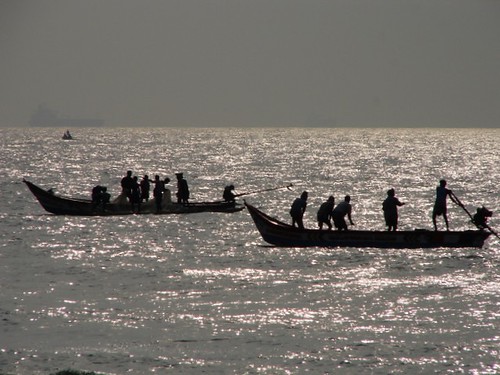When will they celebrate their Independence? Common plight of Indian and Pakistani Fishermen

India and Pakistan share many things together. One such thing is their consecutive independence day. Today I thought of addressing an issue which is vital to both the countries. No, its not Kashmir. It is something more fundamental that concerns me today.The detention of Indian and Pakistani Fishermen cross border can no longer be ignored by us.
Official Statistics
According to the Pakistan Fisherfolk Forum 159 Pakistani fishermen are detained in India on the other hand 547 Indian Fishermen have been detained in Pakistan. Moreover India has 200 Pakistani and Pakistan has about 350 Indian boats in their custody. It is a large possibility that the actual figures are much higher.
Why are the fishermen arrested?
Due to the Sir Creek border dispute between the nations, their sea borders are not clearly defined. Thus it is difficult for the fishermen to distinguish marine territories. Moreover, they have low understanding of maritime borders and protocols.
Seldom they cross the marine boundaries and have to pay huge price for it. Most of Indian fishermen who have been detained by Pakistan belong to Gujrat, Daman and Diu. The Gujrat CM Mr. Narendra Modi recently said that the Union Government is ignoring these arrests deliberately.
India shares cordial relations with Bangladeshi and Sri Lankan authorities and fishermen arrested in these countries are easily acquitted. But since India and Pakistan do not share cordial diplomatic ties, it is difficult for both the countries to protect their arrested fishermen.
Fishermen’s Plight
Most of the fishermen have been in jails for years.Their bona fide mistake costs them more than any crime they could have done. Their families are unaware of their presence. Generally a boat consists of all the fishermen from the same family. Any mistake may result in arrest of all the “earning male members” from a single family. In such situations their family suffers both emotionally and economically. The hope for return never dies but everyone is aware that the chances are negligible.
Laws and Punishment
In India illegal entrants in the country may be punished with imprisonment of 3.5 months to 5 years.
According to the Article 73 of the United Nations Convention on the Law of the Sea, arrested vessels and crew are to be promptly released “upon the posting of reasonable bond or other security” and should not result in imprisonment or corporal punishment. The nations must invoke this article to ensure the early acquittal of the marine prisoners.
What is and What can be done?
The suspicion of terrorist activities forces the marine officers to do their duty diligently. Their work needs to be admired but once it is established that the arrested are not guilty of criminal tresspass, they must be released. This can be done only with the development of diplomatic understanding between the two nations.
In past both the nations have issued declaration of fishermen releases but things have never materialized. Most of them who have completed their sentences are not released either. Both the nations believe “we would release our prisoners only when they release theirs.” This diplomatic release game treats these prisoners as pawns. They are left of the mercy of their leaders to get what they lawfully deserve.
The ones who are released are in no good shape either. Generally, they are disillusioned, ill, infirm and depressed. A young lad returns as a feeble old man with grayed hair. He fails to be with his wife and family. His children become alien to him. His parents are no longer alive to meet him. His wife lived like a married widow all throughout her life.
Moreover, even if the countries release a prisoner they never release his vessel. A boat costs Rs 5 to 6 lakhs is usually bought on installments. A fishermen has virtually no resources to afford another vessel. Most of them are poor and uneducated can neither opt another career.
Conclusion
Action is required to be taken immediately. Indian and Pakistani Supreme Courts have realized the importance of the crucial issue.
In a dispute the Union government pleaded to detain the Pakistani fishermen in jail until Pakistan releases an equal number of Indian fishermen. However SC of India rightly held otherwise and ordered release of 16 Pakistani fishermen who had served their sentence.
In Pakistan no person can be kept in jail after 3 months of completion of his/her sentence. But the government sought permission to keep Indian fishermen in jail even when they had completed their sentence. The Pakistan SC has also taking cognizance of the matter has also ordered the release of Indian fishermen.
The courts in both the countries are performing the duties of the executive. But the implementation of these orders depend totally on the will of the governments. They have ignored the plight of the fishermen for 63 years which is no longer justified. Arrest of 800 fishermen affects 800 families in India and Pakistan.
Sadly, these fishermen can never cherish independence in the same sense as we do until some diplomatic actions are taken.
Read more

 Tiger skin, guns, stuffed tigers and photographs of tiger assassination were thought to be signs of bravery by the kings and British in past. But today’s commercial society is concentrating on the extraction of profit from the tiger trade.
Tiger skin, guns, stuffed tigers and photographs of tiger assassination were thought to be signs of bravery by the kings and British in past. But today’s commercial society is concentrating on the extraction of profit from the tiger trade.